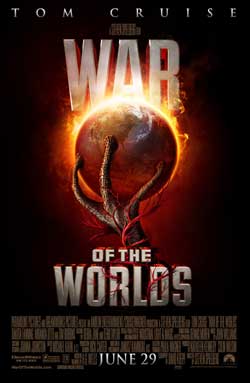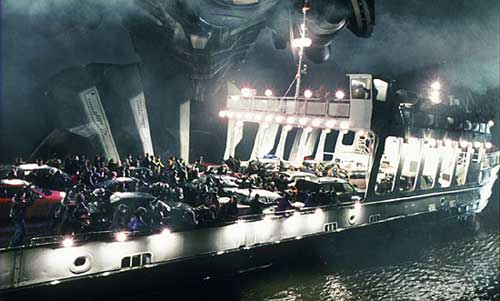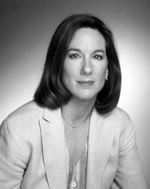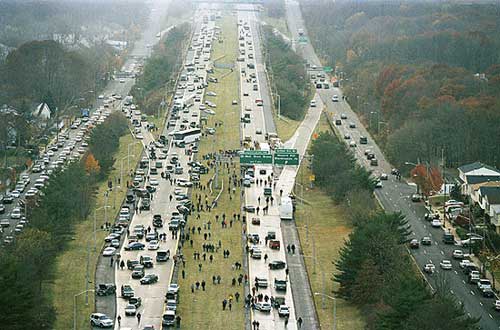 Wednesday I attended the massive War of the Worlds press junket in New York City. In the days leading up to the release of the film we’re going to be kicking our WOTW coverage into overdrive with interviews, a massive tag team review, the final days of our Win a WOTW PC Contest and even a brand new contest that we’re starting up in hours. I can’t give an official review until Wednesday, but I can tell you this – War of the Worlds is a damn good movie. It’s like the Spielberg who made Jaws and the Spielberg who made Jurassic Park decided to get together and kick humanity’s ass.
Wednesday I attended the massive War of the Worlds press junket in New York City. In the days leading up to the release of the film we’re going to be kicking our WOTW coverage into overdrive with interviews, a massive tag team review, the final days of our Win a WOTW PC Contest and even a brand new contest that we’re starting up in hours. I can’t give an official review until Wednesday, but I can tell you this – War of the Worlds is a damn good movie. It’s like the Spielberg who made Jaws and the Spielberg who made Jurassic Park decided to get together and kick humanity’s ass.
Kathleen Kennedy first came into Steven Spielberg’s circle with 1941 and Raiders of the Lost Ark, and it was soon after that she started producing for the director, with ET. War of the Worlds is the 12th film of his that she’s produced, and the two have produced a dozen other films together, ranging from the Back to the Future films to Jurassic Park III.
Q: To what do you attribute the fact that you’ve worked with Steven for so many years? It’s unusual for people to remain together so long in this business.
Kennedy: To actually remain friends for 20 years? I guess what I attribute it to is that we both love the same kinds of movies. We both have very eclectic tastes. I think we share a lot of the same points of view on the kind of movies that we enjoy and that we hope the audience enjoys. I guess that is relatively rare that you have that kind of flexibility with somebody and can sort of move through your life and have things change and change in similar ways.
Q: Even most marriages don’t last that long.
Kennedy: Mine did! I met Frank [Marshall] when we were making Raiders of the Lost Ark and the two of us have been together for almost twenty five years.
Q: You don’t seem like a yes person.
Kennedy: I’m not a yes person! I tell Steven exactly how I feel about something. I don’t try to second guess whether he’s going to be upset about whether I agree or disagree. I have an opinion, it’s mine, I don’t profess to be right or wrong because I think the creative process is about points of view. There usually isn’t a right or wrong answer. I think that when you can engage in a dialogue with somebody in the creative process and you know that they’re really going to honestly tell you how they feel and you’re not going to get some fake response, that ends up being one of the lasting relationships that you have, because you know that you can trust those responses.

Q: With War of the Worlds were you guys on the same page right away?
Kennedy: He called me up and said, “Hey Kath what do you think? Let’s put this on the back burner for a while and do Mission: Impossible. The only problem is that I have to start shooting in November.” He knew what my response was going to be, which was “That’s impossible.” So before I even got that out of my mouth he said, “No look, look at what it is. It’s basically a family, three people, with about a thousand people running around now and again!”
I looked at it again and started evaluating whether this was possible. Frankly I get excited by those kinds of challenges as much as he does, so I said OK. So we started pulling together the people we had worked with for a number of years, which was the only way we could have done this. The majority of this crew has worked together for 15-20 years. There’s a real short hand with this group. And it was fun. I have to say that you can take an experience like this and have it be grueling, tense, a lot of yelling and screaming – this was none of that. We absolutely had a blast from beginning to end. It was surprisingly fun.
Q: Before you guys did ET, that evolved from a darker story called Night Skies…
Kennedy: Yeah. We were intending to literally do much more of a horror movie, based on an actual incident that Steven had run across when he was doing Close Encounters. There was a wonderful man by the name of J Allen Hyneck who actually worked in the government investigating UFO sightings, and he had run across a very interesting case that we were going to develop into a horror movie. It was the final image of that screenplay that inspired ET. Then Steven said to me at one point when we were developing that script and making Raiders of the Lost Ark, “You know, I just don’t think coming off of Close Encounters that I can make a movie about aliens that doesn’t have a more benign, hopeful message.” So he completely turned the corner and he started developing ET. But clearly now he was ready to make an alien movie that wasn’t so benign!
 Q: How much of that development stuff came back for War of the Worlds? Night Skies as I understand was about a similar scenario, a family during an alien invasion.
Q: How much of that development stuff came back for War of the Worlds? Night Skies as I understand was about a similar scenario, a family during an alien invasion.
Kennedy: Yeah, actually we never referenced that. The credit on this has to be given to HG Wells. What inspired this movie was to go back to the book and to realize that what HG Wells wrote a hundred years ago is amazingly relevant today and that the reinterpretation of it in a contemporary setting works as well today as it did then. That’s where the inspiration came from.
Q: The George Pal version had a paranoia that was borne of the Cold War. Now we have different reasons to be paranoid and they seem to be reflected here.
Kennedy: Yeah, I think that’s inescapable. To say that people won’t come to this movie without that kind of baggage – that wasn’t the inspiration, we didn’t make this movie and say “Let’s make a paranoid movie.” We were making a piece of entertainment, an alien invasion movie is how that all started out. But certainly people can read into it either metaphorically or symbolically as to what it means. I think it’s a product of its times – people did that with HG Wells and when they saw the 1950s movie they were coming off the World War and into the Cold War, so they were bringing that context into the movie. So it’s certainly possible that people will bring the current context to this movie.
Q: What were the rules going into the movie? We have heard that one was that there would be no destroying of landmarks, because we’ve seen that in too many other movies.
Kennedy: Well I think the key guideline structurally, in the storytelling, was that we kept it very much from the point of view of the family. We were very careful that what Ray Ferrier knew made the audience feel how you would if there was no outside information coming in, that you would begin to feel very isolated. That produces a real sense of tension and fear. I hesitate to call that a rule, but I think that was a very key decision that was made early in the writing process.
Q: I was surprised at how dark this film is. There are some truly scary moments in the movie. When it comes to a marketing standpoint are you concerned that the audiences are expecting more of an Independence Day?
Kennedy: I think people like scary movies. I think that scary movies you can talk about – that’s the thing about the science fiction genre. If done well, they give you a lot to talk about. Usually they’re the best kind of cautionary tales.
I think people are ready for something like this, and I think they’re ready for something different. I think the nice thing is that most people going into this movie don’t know what to expect. It’s a surprise. We’re in a time where we have so much marketed to us and we’re told “You’re going to like this, you’re going to see this, you’re going to buy this,” it’s nice to kind of go in and feel like you’re discovering something. Somebody hasn’t told you how to feel about it.

Q: That’s interesting. Is it the case that today only a Steven Spielberg can do that, can not give away the entire movie in the trailer?
Kennedy: I don’t know that it’s only Steven Spielberg. I will say that as filmmakers we have to be really tenacious these days about saying, “No, you can’t do that,” and trying to conserve as much as possible. I don’t blame the studios for doing what they’re trying to do. They have a huge amount at stake, they have the problem of having to open movies on a weekend and if you don’t you’re considered a failure. There’s a fear factor in whether or not you told the audience enough to get them to show up and not held back too much. It’s a fine line. Certainly Steven has a somewhat easier time because certain people are going to come to the movie because of him, so that helps. It’s a tricky balance.
Q: Do you pay a lot of attention to test screenings?
Kennedy: I haven’t done any test screenings with Steven in years. We usually pull our little group together – as I said, this is what goes against the “yes man” theory. If you’re going to put seven or eight people in a room and they’re going to tell you that what you just did doesn’t make any sense they’ll say it!
Now with the Internet the creative process – we don’t go into this and say “We’re going to do this and it’s going to be perfect.” We’re always involved in a process, and if we want to go show it to a group of people and get their ideas and then know that it’s going to end up on the Internet the next day – that creates a huge sense of paranoia. The previewing process now has become something that filmmakers fear, where before we liked to use it to see if we had to tweak something here or there. Now you live in fear that everything will end up on the Internet.
Q: So last week Christian Bale has the number one movie in America, and you guys kind of discovered him.
Kennedy: I know, it’s so amazing to think that he’s Batman! We pulled him out of the School of Ballet in London! He was 12 years old and he was amazing. He was as amazing a kid as Dakota. Every ten years or so an extraordinary child comes along and Dakota is one of those kids. She is just just remarkable. Absolutely great to work with, as good as any adult on the set.
Q: She’s not an average kid.
Kennedy: She is and she isn’t I have a 9 year old and when we would come to visit the set the two of them would go hand in hand off and do all kid stuff and then she would turn around, show up in front of the camera and be bang on.

Q: She seems very mature for her age, but she’s still a kid. How do you keep a kid motivated?
Kennedy: We didn’t have to deal with that. She’s beyond that. It’s very clear that this is a decision that she’s made, this is a career that she wants to pursue. She has great parents and it’s clear that she doesn’t have anybody influencing her decision. She’s very together about it.
Q: For the last couple of years you guys have been making a ton of movies. What’s with the two movies a year thing? How can you guys keep up the pace?
Kennedy: We’re not keeping up the pace. We’re getting older.
Q: Why did Steven leave Memoirs of a Geisha?
Kennedy: The thing is that Steven’s at the point in his career where there’s a lot of movies he can do if he wants to. It’s tough trying to decide what you’re going to spend a year, two years, three years doing. That’s a tricky one, trying to articulate why you decide to do some things and not others.
Q: In your career is there a film that you think has been unfairly overlooked?
Kennedy: Empire of the Sun. I love Empire of the Sun. I really regret that – there was a lot of confusion because it came out with Last Emperor, and I think people didn’t know what was what. That’s a movie that I think was overlooked.
Q: Is there going to really be another Indiana Jones?
Kennedy: If we see a script that we like. We’ll see a script hopefully in about two months and we’ll decide if we’re going to do it next. Jeff Nathanson is on it right now.
Q: What about Goonies 2?
Kennedy: That is the movie that just kills me. So many people of your generation – it’s like some kind of cult thing. Maybe. I don’t know. That’s one that just kind of floors us that it still stuck around. You’re not alone. I get asked that all the time.